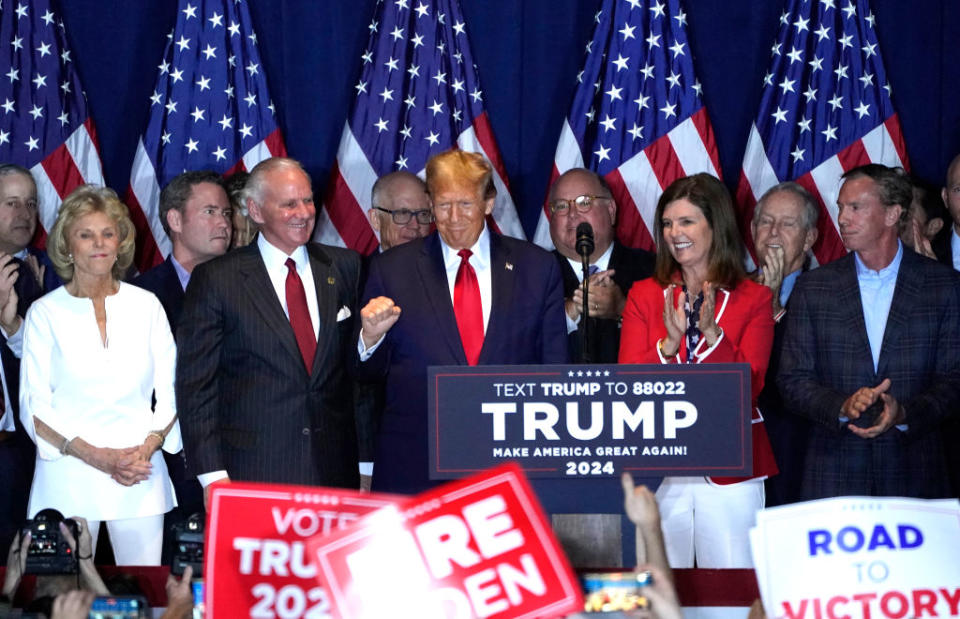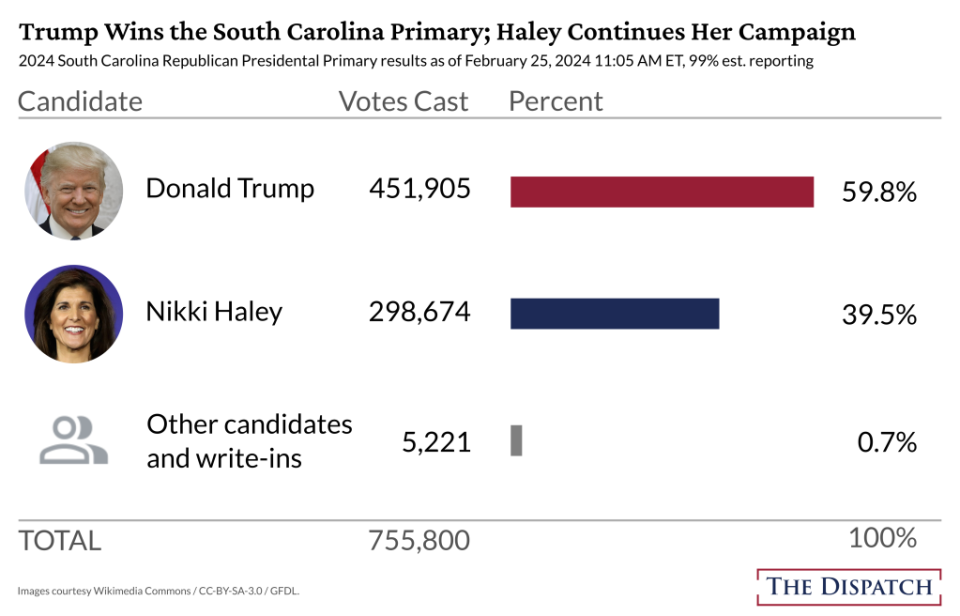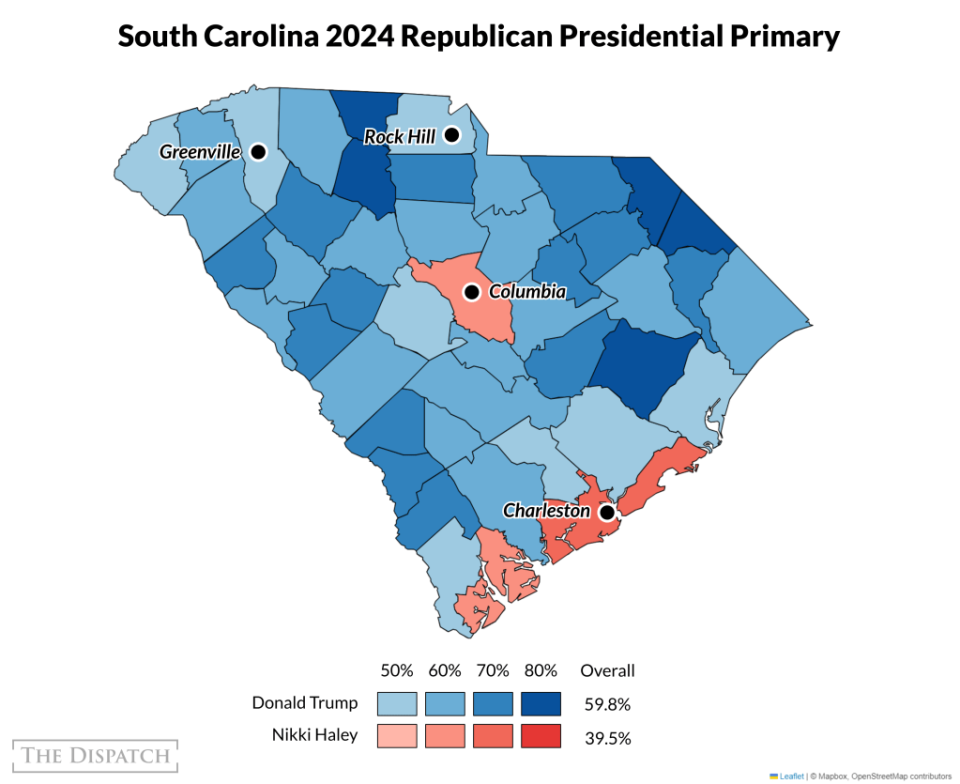Another Primary, Another Trump Victory
- Oops!Something went wrong.Please try again later.
- Oops!Something went wrong.Please try again later.
- Oops!Something went wrong.Please try again later.
From the The Morning Dispatch on The Dispatch

Happy Monday! We hope this week is a quiet one for the good people of Plymouth, England. They deserve it after the week they had: Last Tuesday, someone found an unexploded WWII-era German ordnance in their backyard, and thousands were forced to leave their homes as it was removed—one of the largest evacuation efforts in the U.K. since the war itself. The bomb was intentionally detonated at sea on Friday.
Quick Hits: Today’s Top Stories
Russian officials transferred custody of Alexei Navalny’s body to his mother, a spokesperson for the family said Saturday, after prison authorities originally suggested they would hold it for several more days. The family has not yet announced plans for a funeral; authorities had at one point made the body’s release conditional on the family’s promise to hold a private ceremony. Meanwhile, President Joe Biden announced sanctions on more than 500 people and entities related to Russian President Vladimir Putin’s regime—including financial institutions and groups linked to the country’s military-industrial base— to mark the anniversary of the second anniversary of the war in Ukraine and to punish Putin for Navalny’s death in a Siberian penal colony earlier this month.
U.S. Central Command announced on Saturday that the U.S. and United Kingdom, with the support of several allies, carried out their fourth round of strikes against 18 Houthi rebel targets in eight locations in Yemen. The strikes—an effort to neutralize the threat of ongoing Houthi attacks on commercial shipping in the Red Sea—were aimed at weapons storage facilities and other targets, including a helicopter used by the rebels. “We will continue to make clear to the Houthis that they will bear the consequences if they do not stop their illegal attacks, which harm Middle Eastern economies, cause environmental damage, and disrupt the delivery of humanitarian aid to Yemen and other countries,” Secretary of Defense Lloyd Austin said in a statement.
Ukrainian President Volodymyr Zelensky said Sunday that 31,000 Ukrainian troops have been killed since the beginning of the full-scale Russian invasion two years ago Saturday. That number—the first time Ukrainian officials have provided such a figure publicly—is far below estimates usually given by Western officials, which are often double that figure. Meanwhile, Canada promised additional funding to Ukraine over the weekend, announcing just over $2 billion in aid this year.
The U.S. and South Korea conducted joint drills over the Korean peninsula with stealth fighter jets on Friday as a response to six missile tests by North Korea this year. The exercises were aimed at training pilots to intercept low-flying rockets in the event of an attack.
Former President Donald Trump beat former U.N. Ambassador Nikki Haley in Saturday’s South Carolina primary, winning nearly 60 percent of the vote to Haley’s 40 percent in her home state. Despite the loss, Haley vowed to stay in the race, traveling next to Michigan, where both parties will hold primaries on Tuesday.
The Biden administration reversed its predecessor’s position on Israeli settlements in the West Bank, with Secretary of State Antony Blinken on Friday calling them “inconsistent with international law.” The decision—undoing what’s been called the “Pompeo doctrine,” after former Secretary of State Mike Pompeo—followed the suggestion Thursday by the right-wing Israeli finance minister, Bezalel Smotrich, that he would approve 3,000 more settlements in the territory where there have recently been violent clashes between Israeli settlers and Palestinians. “We are disappointed with the announcement [of new settlements],” Blinken said. “It has been a long-standing policy of both Democratic and Republican administrations that new settlements are counterproductive to achieving enduring peace.” Meanwhile, Prime Minister Benjamin Netanyahu released the first detailed plan for Gaza following Israel’s war with Hamas. The proposal, which came the same day as a round of ceasefire negotiations began in Paris, would reportedly see an overhaul of Gaza’s administrative and education systems, the handing of control to Gazans without ties to Hamas, and a “demilitarization” of the strip. Israel would control travel in and out of the strip, including taking over the southern border with Egypt. The plan seems to preclude the possibility of a Palestinian state in the immediate aftermath of the war.
A New York jury on Friday found the National Rifle Association (NRA) and its top leadership, including former CEO Wayne LaPierre, liable for mismanaging millions of dollars of donations to the group. The civil corruption case, brought by New York Attorney General Letitia James, hinged on allegations LaPierre and his colleagues took donated funds to pay for luxury travel and other extravagant personal purchases. LaPierre was ordered to repay roughly $4 million to the NRA.
South Carolina Decided

Perhaps the only South Carolinian who had a worse Saturday night than former Ambassador Nikki Haley was Sen. Lindsey Graham, who was introduced by former President Donald Trump at his victory rally as “a little bit further left than some of the people on the stage.”
He was then loudly booed by the crowd.
Trump’s victory in the South Carolina primary did not come as a surprise Saturday night, though his projected margin of victory over Haley, who previously served as governor of the state for two terms, was slightly smaller than polling predicted. With five primary or caucus victories and 110 delegates now under his belt, Trump looks every bit the inevitable nominee as the candidates shift focus toward the Michigan and Super Tuesday primaries. But despite his unbroken string of victories and insistence that he has united the party, a significant chunk of Republican primary voters are looking for a new standard bearer—which could prove a stumbling block for Trump as he pivots to the general election.

The Associated Press called the race for Trump as soon as polls closed on Saturday night. The former president led his Republican rivals in polling in the Palmetto State since last year, and the RealClearPolitics polling average showed Trump beating Haley by 23 points in the days leading up to the contest. Haley was able to close the gap slightly on primary day, and as of this reporting, Trump was projected to win with 59.8 percent of the vote to Haley’s 39.5 percent. Trump won big among voters who identified as “very conservative,” as well as with white evangelical voters and voters without a college degree, according to CBS News exit polling. Haley, meanwhile, won voters who identified as moderates as well as those who decided who to vote for just this month, though a CNN exit poll showed that over 75 percent of voters indicated they had made up their minds before this year even began.
Haley also benefited from South Carolina’s open primary system, which allows any registered voter who did not vote in the Democratic primary to vote in the Republican contest. Haley won independent voters 53-46 percent, according to those exit polls, though independents made up just 28 percent of the primary electorate. Among Republicans, Trump beat Haley 70-29 percent.
Ultimately, Trump won all but three of South Carolina’s counties (Beaufort, Charleston, and Richland counties all broke for Haley), securing 47 of the 50 delegates that were up for grabs. He took the stage Saturday night and claimed victory, flanked by members of South Carolina’s firmly MAGA-aligned political establishment, including Sens. Graham and Tim Scott, Rep. Nancy Mace, and Gov. Henry McMaster. Scott—who has doggedly campaigned for Trump in recent weeks and been floated as a top vice presidential contender—took the stage for a moment at Trump’s victory rally. “Is South Carolina Trump country?” he bellowed, to cheers of agreement from the crowd.

Trump touched on his usual themes—hitting the border crisis and illegal immigration hard, and promising to “fire” President Joe Biden, hearkening back to his days hosting The Apprentice. He thanked his family, supporters, and MAGA superstars Rep. Matt Gaetz and Marjorie Taylor Greene. In celebrating his win, he marveled at the state of the party he now commands. “I have never seen the Republican Party so unified as it is right now,” Trump said during his victory speech.
Notably absent from his speech was any mention of Nikki Haley, who took nearly 40 percent of the vote from the pseudo-incumbent.
Haley conceded the race and congratulated Trump on his victory—but she vowed yet again to stay in the race. “I said earlier this week that no matter what happens in South Carolina, I would continue to run for president,” she said Saturday night. “I’m a woman of my word.” She used the speech to attack both Biden and Trump, and again argued that she is the Republican who can best achieve victory in November, defying calls to drop out of the primary. On Sunday, Haley traveled to Michigan to campaign ahead of the state’s primary on Tuesday, and her campaign reported $1 million raised in the 24 hours after her South Carolina loss.
The conundrum for Haley’s team, however, is that continued strong fundraising and reliable voter percentages in open primaries have not been enough to win a state. Haley also has just 20 delegates to Trump’s 110—a candidate needs to secure 1,215 delegates to win the nomination, and almost 900 delegates are up for grabs on Super Tuesday alone. The narrowing path is also having an impact on Haley’s bottom line: On Sunday, Politico reported that Americans for Prosperity Action, the deep-pocketed Koch-backed group that endorsed Haley in November, would stop spending money on behalf of Haley’s campaign.
Still, Haley’s string of losses underscores the divide within the Republican Party. “I know 40 percent is not 50 percent,” she said on Saturday, acknowledging her defeat. “But I also know 40 percent is not some tiny group.”
Despite Trump’s insistence that he is unifying the party behind him, there seems to be a bloc of voters committed to voting against another Trump presidency. A Fox News voter analysis revealed that 59 percent of Haley supporters in South Carolina would not support Trump should he be the eventual nominee—which translates to roughly a quarter of the Republican Party. These numbers lend support to Haley’s repeated argument that she, not Trump, is best suited to defeat Biden in November’s general election.
But in South Carolina, such electability arguments rang hollow. A CNN exit poll showed that GOP primary voters overwhelmingly believe the former president would be more likely to beat Biden. While 55 percent of respondents indicated Haley would be very or somewhat likely to win in November, an overwhelming 83 percent indicated Trump would be very or somewhat likely to win.
The candidates will compete next in Michigan on February 27 (yes, this Tuesday), with 16 delegates at stake. Haley is blitzing the state with ads and campaign stops, but she’s quickly running out of time and chances to secure delegates—especially as many states moving forward award the full delegate slate to the winner. For Team Trump, the air of inevitability is almost undeniable. “Every time a rocket launches, you know it goes up real slow and it’s climbing and climbing, and then boom! That next stage comes off and it goes,” Gov. McMaster said Saturday, describing the inflection point in the campaign. “We just did that. We just hit maximum velocity. And we’re going all the way!”
Worth Your Time
Among the list of this year’s CPAC attendees was the John Birch Society, a group once excommunicated from the confab and from polite conservative society, wrote Elaina Plott Calabro for The Atlantic. This year, they’re back. “The John Birch Society, once the scourge of some of the nation’s most prominent conservatives, relegated to the outermost edges of the movement, now fits neatly into the mainstream of the American right. David Giordano, another field coordinator for the organization who was attending CPAC, credited Trump for hastening the shift, challenging the global elite in ways that past Republican presidents had only ever talked about doing. ‘What were the things they said about him? ‘Racist’ and ‘anti-Semitic’—that got my attention,’ Giordano told me, smiling. ‘What’d they say about the John Birch Society? ‘Racist’ and ‘anti-Semitic.’ That’s when you know you’re over the target.’ Longtime members and officers of the organization exuded the polite but unmistakable air of I told you so at the conference. ‘A lot of people will say, ‘Oh, my grandmother or my dad was a member. We used to think he was crazy, but now, not so much,’ Smart said, beaming. ‘Because we’ve been warning people about a lot of this stuff for decades, obviously.’”
Presented Without Comment
Politico: [California Gov.] Gavin Newsom: Biden’s Age is an Asset
Also Also Presented Without Comment
Washington Post: Trump Says Black Voters Like Him More Because of His Indictments and Mug Shot
Toeing the Company Line
TMD’s own Mary Trimble answered member questions in this month’s Mailbag (🔒)!
Tim Mak and Bennett Murray joined Declan, Steve, Jonah, and Mary to discuss their reporting on the ground in Ukraine in a special weekend edition of Dispatch Live, and Sarah, Steve, Jonah, and Mike hosted a panel discussion on the future of conservatism at the Principles First conference in Washington, D.C.
In the newsletters: Drucker and John previewed this weekend’s South Carolina primary, Sarah and Mike covered the Alexander Smirnov indictment and the effects of Trump’s prosecutions on his campaign, Nick reflected on (🔒) the complicated politics of the Alabama IVF ruling, Jonah answered the question, “When does a nation become a country?”, and Chris outlined (🔒) the stakes of Saturday’s primary in Nikki Haley’s home state.
On the podcasts: Mike was joined by Chris, Jonah, and Steve to discuss the role of factionalism in political parties and the Smirnov indictment on a Dispatch Podcast roundtable, Mary interviewed procurement expert Mark Cancian about what we mean when we say “aid to Ukraine,” Jonah ruminated on Joe Biden’s dog, Commander, stay-at-home girlfriends, and the Alabama IVF ruling on The Remnant, and Jamie is joined by Nicholas Eberstadt, a political economist at the American Enterprise Institute, to explain the recent fear that North Korea is preparing for war on the Dispatch Podcast.
On the site over the weekend: Megan Dent revisited the life of Simone Weil, and Marvin Olasky reflected on the correspondence between George Washington and poet Phyllis Wheatley.
On the site today: John files a dispatch from CPAC, and Teddy Ray previews the social media cases in oral arguments before the Supreme Court today.
Let Us Know
Do you think the Trump campaign will be able to convince enough of Nikki Haley’s supporters to vote for Donald Trump in November?

